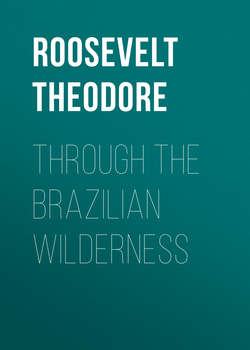Through the Brazilian Wilderness

Реклама. ООО «ЛитРес», ИНН: 7719571260.
Оглавление
Roosevelt Theodore. Through the Brazilian Wilderness
PREFACE
I. THE START
II. UP THE PARAGUAY
III. A JAGUAR-HUNT ON THE TAQUARY
IV. THE HEADWATERS OF THE PARAGUAY
V. UP THE RIVER OF TAPIRS
VI. THROUGH THE HIGHLAND WILDERNESS OF WESTERN BRAZIL
VII. WITH A MULE TRAIN ACROSS NHAMBIQUARA LAND
VIII. THE RIVER OF DOUBT
IX. DOWN AN UNKNOWN RIVER INTO THE EQUATORIAL FOREST
X. TO THE AMAZON AND HOME; ZOOLOGICAL AND GEOGRAPHICAL RESULTS OF THE EXPEDITION
APPENDIX A
APPENDIX B
APPENDIX C
Отрывок из книги
One day in 1908, when my presidential term was coming to a close, Father Zahm, a priest whom I knew, came in to call on me. Father Zahm and I had been cronies for some time, because we were both of us fond of Dante and of history and of science—I had always commended to theologians his book, "Evolution and Dogma." He was an Ohio boy, and his early schooling had been obtained in old-time American fashion in a little log school; where, by the way, one of the other boys was Januarius Aloysius MacGahan, afterward the famous war correspondent and friend of Skobeloff. Father Zahm told me that MacGahan even at that time added an utter fearlessness to chivalric tenderness for the weak, and was the defender of any small boy who was oppressed by a larger one. Later Father Zahm was at Notre Dame University, in Indiana, with Maurice Egan, whom, when I was President, I appointed minister to Denmark.
On the occasion in question Father Zahm had just returned from a trip across the Andes and down the Amazon, and came in to propose that after I left the presidency he and I should go up the Paraguay into the interior of South America. At the time I wished to go to Africa, and so the subject was dropped; but from time to time afterward we talked it over. Five years later, in the spring of 1913, I accepted invitations conveyed through the governments of Argentina and Brazil to address certain learned bodies in these countries. Then it occurred to me that, instead of making the conventional tourist trip purely by sea round South America, after I had finished my lectures I would come north through the middle of the continent into the valley of the Amazon; and I decided to write Father Zahm and tell him my intentions. Before doing so, however, I desired to see the authorities of the American Museum of Natural History, in New York City, to find out whether they cared to have me take a couple of naturalists with me into Brazil and make a collecting trip for the museum.
.....
There is in the United States a beautiful and attractive snake, the king-snake, with much the same habits as the mussurama. It is friendly toward mankind, and not poisonous, so that it can be handled freely. It feeds on other serpents, and will kill a rattlesnake as big as itself, being immune to the rattlesnake venom. Mr. Ditmars, of the Bronx Zoo, has made many interesting experiments with these king- snakes. I have had them in my own possession. They are good-natured and can generally be handled with impunity, but I have known them to bite, whereas Doctor Brazil informed me that it was almost impossible to make the mussurama bite a man. The king-snake will feed greedily on other snakes in the presence of man—I knew of one case where it partly swallowed another snake while both were in a small boy's pocket. It is immune to viper poison but it is not immune to colubrine poison. A couple of years ago I was informed of a case where one of these king-snakes was put into an enclosure with an Indian snake- eating cobra or hamadryad of about the same size. It killed the cobra but made no effort to swallow it, and very soon showed the effects of the cobra poison. I believe it afterward died, but unfortunately I have mislaid my notes and cannot now remember the details of the incident.
Doctor Brazil informed me that the mussurama, like the king-snake, was not immune to the colubrine poison. A mussurama in his possession, which had with impunity killed and eaten several rattlesnakes and representatives of the lachecis genus, also killed and ate a venomous coral-snake, but shortly afterward itself died from the effects of the poison. It is one of the many puzzles of nature that these American serpents which kill poisonous serpents should only have grown immune to the poison of the most dangerous American poisonous serpents, the pit-vipers, and should not have become immune to the poison of the coral-snakes which are commonly distributed throughout their range. Yet, judging by the one instance mentioned by Doctor Brazil, they attack and master these coral-snakes, although the conflict in the end results in their death. It would be interesting to find out whether this attack was exceptional, that is, whether the mussurama has or has not as a species learned to avoid the coral-snake. If it was not exceptional, then not only is the instance highly curious in itself, but it would also go far to explain the failure of the mussurama to become plentiful.
.....